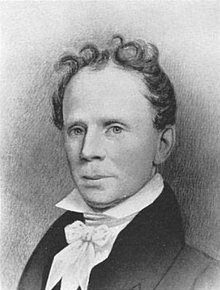Enoch Lincoln
| Enoch Lincoln | |
|---|---|
 |
|
| 6th Governor of Maine | |
|
In office January 3, 1827 – October 8, 1829 |
|
| Preceded by | Albion Parris |
| Succeeded by | Nathan Cutler |
| Member of the U.S. House of Representatives from Maine's 5th district |
|
|
In office March 4, 1823 – 1826 |
|
| Preceded by | Ebenezer Herrick |
| Succeeded by | James W. Ripley |
| Member of the U.S. House of Representatives from Maine's 7th district |
|
|
In office March 4, 1821 – March 3, 1823 |
|
| Preceded by | District created |
| Succeeded by | David Kidder |
| Member of the U.S. House of Representatives from Massachusetts's 20th district |
|
|
In office November 4, 1818 – March 3, 1821 |
|
| Preceded by | Albion Parris |
| Succeeded by | District eliminated |
| Personal details | |
| Born |
December 28, 1788 Worcester, Massachusetts |
| Died | October 8, 1829 (aged 40) Augusta, Maine |
| Political party |
Democratic-Republican National Republican |
| Alma mater | Harvard College |
| Profession | Lawyer |
Enoch Lincoln (December 28, 1788 – October 8, 1829) was a U.S. Representative from Massachusetts and from Maine, son of Levi Lincoln Sr. and brother of Levi Lincoln Jr. Born in Worcester, Massachusetts, Lincoln graduated from Harvard College in 1807. He also served as Governor of Maine from 1827 until his death in October 1829.
He studied law, was admitted to the bar and commenced the practice of his profession in Salem in 1811. He served as United States district attorney 1815–1818, and moved to Paris, Maine (then a district of Massachusetts), in 1819 and continued the practice of law.
In November 1818, Lincoln was elected as a Democratic-Republican, representing the Maine district, to the Fifteenth Congress to fill the vacancy caused by the resignation of Albion K. Parris. He was reelected to the Sixteenth Congress and served from November 4, 1818, to March 3, 1821.
Lincoln was elected a member of the American Antiquarian Society in 1819. A portion of his business and personal papers resides in the manuscript collections of the AAS within the Lincoln Family Papers.
Upon the admission of Maine as a state, he was again elected as a Democratic-Republican to the Seventeenth Congress, and reelected as an Adams-Clay Republican to the Eighteenth Congress, and elected as a Pro-Adams candidate to the Nineteenth Congress and served from March 4, 1821, until his resignation some time in 1826. He served as Governor of Maine from 1827 until his death. He won three terms, all with over 90% of the vote. He did not run for a fourth term.
...
Wikipedia
